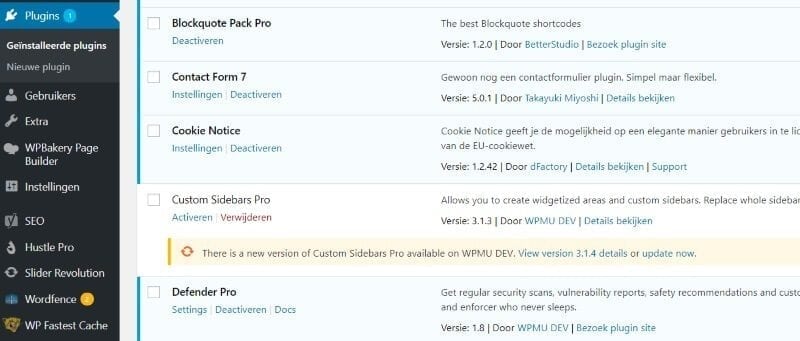Do you have to remove deactivated WordPress plugins? I sometimes get that question.
On several websites, I also have a few plugins which I sometimes ‘turn off’, without removing them. But is that wise? In this article, I’ll tell you the ins and outs for whether or not to remove inactive plugins…
What are inactive WordPress plugins?
As you know, you can install all kinds of plugins to add extra features to your website. If you install a plugin, you will see that it has yet to be activated.

Only then does the plugin become active and the functions come into operation.
There are several reasons for not activating a plugin.
It’s possible that you find that the plugin is not working properly and then you deactivate it again. I myself had problems with Thirsty Affiliates, for example, which is shown in the image above. The plugin didn’t work properly and the site started to show problems, so I quickly deactivated the plugin again. You should then contact their support department to find out what the problem is.
But in the meantime, I didn’t want to remove the plugin completely, because then you’ll also remove all settings. I had already changed a number of settings and I wanted to keep them.
So the maxim is:
If you deactivate the plugin, the settings will be maintained.
If you remove the plugin, you also remove the settings.
Adverse effect
Returning to the question of whether deactivated WordPress plugins affect or adversely affect the performance or functioning of your website? No, that is not the case.
It’s a somewhat technical story that I won’t bother you about too much, but every time you start your website, WordPress starts loading your plugins. But that only happens with the active plugins. The deactivated plugins have absolutely no effect on that loading process and remain unused.
This means that your website will not be slowed down by deactivated WordPress plugins, as is sometimes thought. Also, take a look at the article In 11 steps from snail’s pace to super-fast website.
So whether you have 1 or 10 deactivated plugins on your website, it doesn’t have an effect on your website’s performance.
But does it not matter at all whether I leave them alone or not? Well, that does matter.
I would recommend that you remove deactivated plugins in due time. Though deactivated plugins do not affect the performance of your website, it’s possible that outdated plugins will become vulnerable to hackers. It is possible that a hacker will gain access to your website via an outdated plugin that is not sufficiently secured.
Remove deactivated WordPress plugins
And so you shouldn’t leave inactive plugins on your website for too long.
What you can do is that WordPress now also offers the possibility to update deactivated plugins.
So you can update the deactivated plugin without any problems, without it being activated.

Is it clear in this way? It’s a matter of common sense when you activate and deactivate plugins. Of course, it can do no harm to deactivate a plugin for a while, but if you have not used it for a few months, you should remove it.




